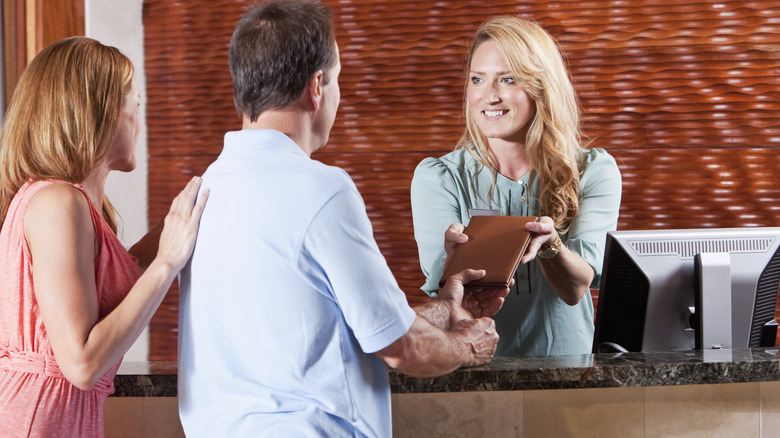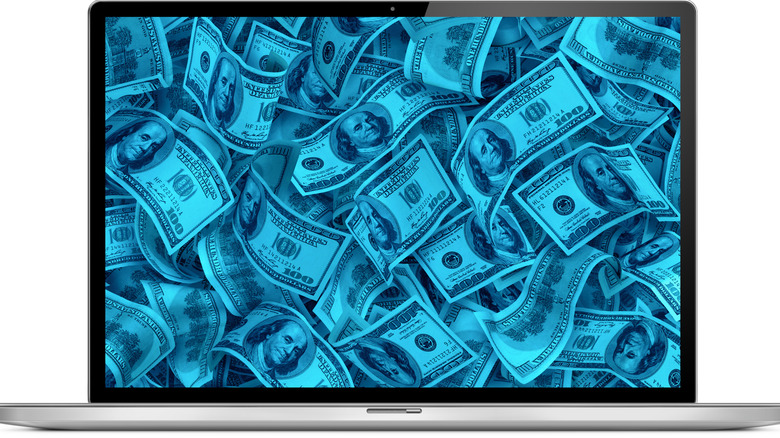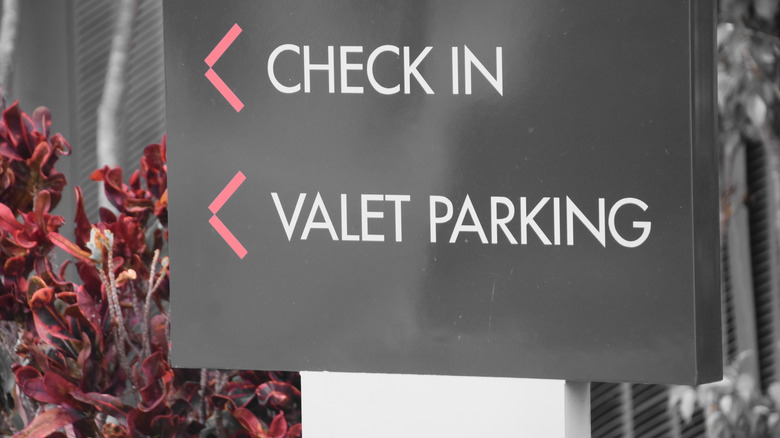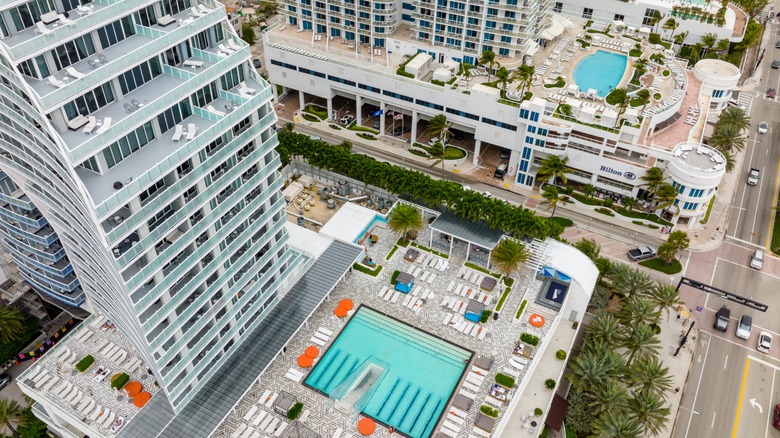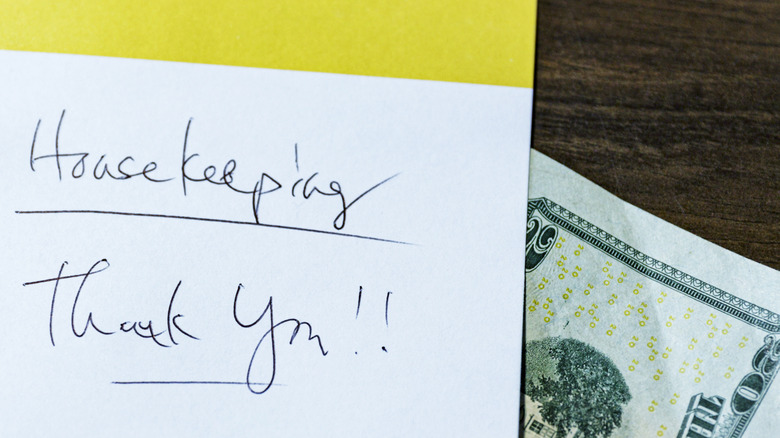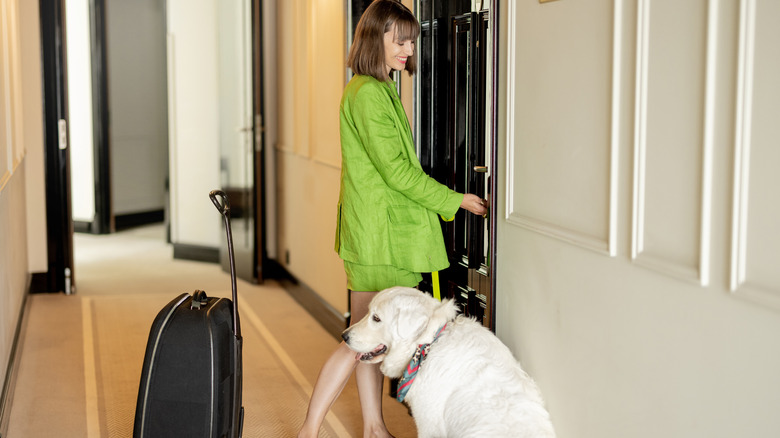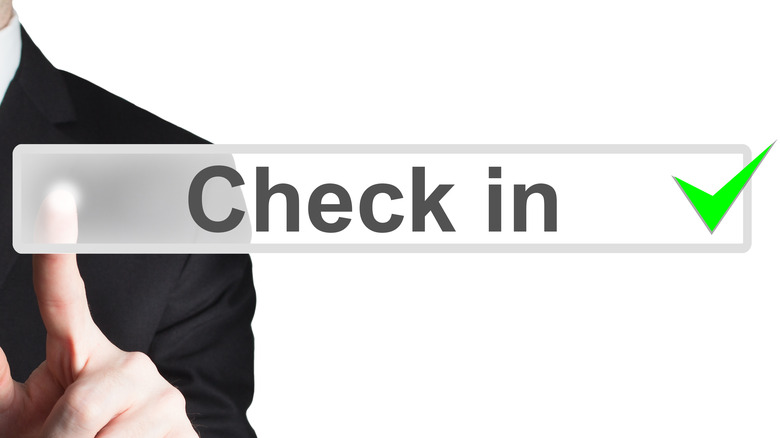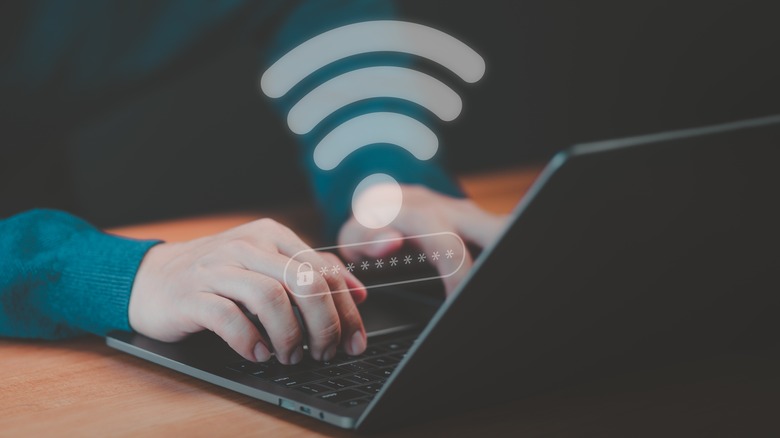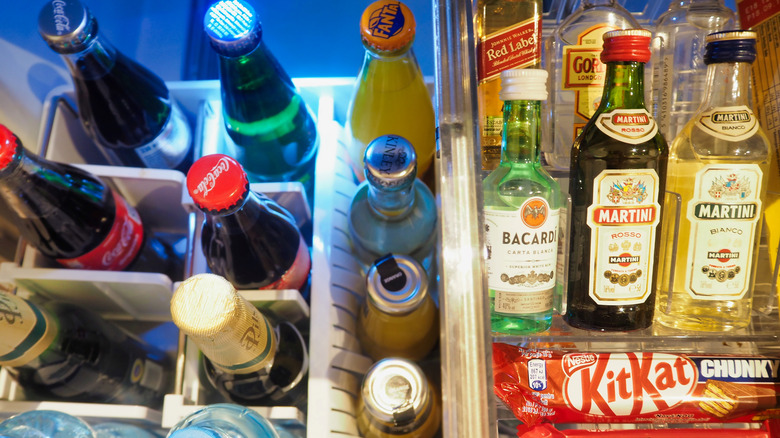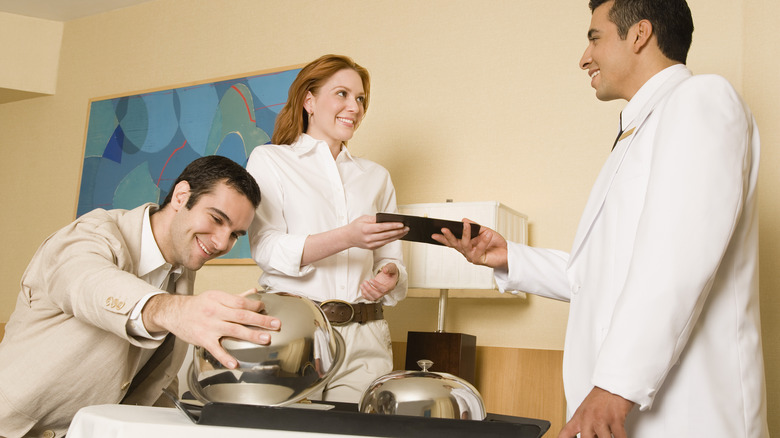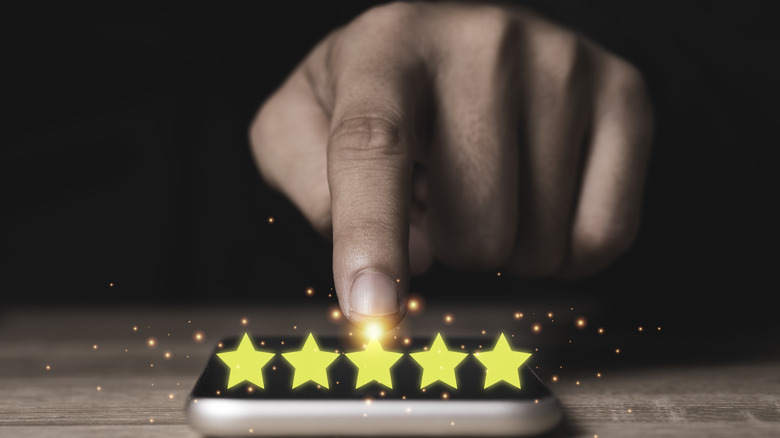12 Sneaky Ways Hotels Trick You Into Spending Money
Finding a great rate on a hotel room doesn't necessarily mean that you've cracked the code to traveling or spending the night away from home on the cheap. Sure, you aren't paying more for a place to sleep than necessary — but your final hotel bill might not necessarily be limited to the per-night price. Even beyond the surprisingly high hotel taxes that everyone has to pay, it's all too easy to rack up add-on charges when you're staying at a hotel, including ones that you weren't expecting.
The best way to prevent sticker shock when it's time to check out is to be aware of the various (and more than a bit sneaky) ways hotels may try to trick guests into spending money. After all, knowledge is power. When you're informed about the surprising ways hotel fees and miscellaneous costs could find their way onto your bill, you'll know what to watch for and be able to be vigilant in taking steps to avoid incurring unnecessary extra charges.
Promoting prepaid (but nonrefundable) rates
When you search a hotel website for room options, chances are that you're on the lookout for the best possible price. That's great, but there are situations in which the lowest rate may not be the best option. That's because the lowest room rates sometimes come with the least flexible terms. In many cases, the lowest available booking rates require payment in full at the time of booking and cannot be canceled or rescheduled. This is why it's important to always read and understand every word of the fine print before finalizing a reservation.
Even if you feel confident that your travel plans won't change, booking a nonrefundable hotel stay is not without risk. Say you're traveling for a wedding. Will you still want to go to the area if it gets called off? If not, you're going to have spent more than a chunk of change on a hotel room that doesn't get used. What if you or someone in your party gets sick or if the weather makes it difficult or impossible to travel? If you've made a nonrefundable booking, you won't be getting your money back.
Higher hotel prices for online hotel reservations
Using the internet to book hotel rooms can be very convenient, and sometimes it's a great way to find a terrific rate. However, that's not always the case. Don't assume that the fact that you've found a hotel rate online means that you've gotten the best available price. In many cases, you'll be able to get a better price by calling the hotel directly and asking. You'll be in a better position to do so, however, if you've done some online research first and can let the hotel employee know the best rate you found online in case the price they initially quoted isn't lower than what you found online.
Most hotels, even ones with highly recognizable brand names, are independently owned and operated. The hotel owners have to pay booking fees for reservations made via their brand's corporate website, and third-party travel booking websites receive sales commissions for bookings processed through their sites. When you call a hotel directly, the property doesn't have to pay fees and sales commissions to a third party, so they may be willing to pass on (or at least share) that savings with guests.
On-site or valet parking fees
If you're going to need a parking spot at your hotel, parking costs are an important factor to consider. Some hotels offer free parking, but many do not — especially upscale resorts and those in downtown areas. Parking fees commonly range from $25 to $35 per day, but can be even higher, especially in large cities. Parking fees aren't typically disclosed clearly when you search for room rates, so you may need to do a bit of digging to see if your hotel charges extra for parking. Otherwise, you might be in for a pricy surprise when you arrive.
You can usually find this information listed in the amenities section of a hotel's website, though you may need to call and ask. If they do charge, be sure to find out if they offer self-parking, valet, or both (and plan for the cost of tipping if valet is the only — or best — option). Once you know if there is a parking fee and how much it is, factor that cost in when comparing prices at different properties. If not, you could find out the hard way that what you thought was a bargain rate will end up being much more costly.
Tacking on a resort or amenity fee
You don't have to stay at a fancy resort to find yourself being stuck with what a property has deemed as a mandatory resort fee (or similarly-named junk fee) tacked on to your hotel bill. When resort fees were first introduced, they were typically limited to super high-end resorts with loads of upscale amenities, but now even mid-range properties sometimes add on this type of fee, on a per-night basis, without quoting it as part of the room rate. Resort fees are sometimes called by other names, such as amenity fees or destination fees.
Not all hotels charge resort fees, but the ones that do typically add between $25 and $35 per night to the room cost. And they don't all clearly disclose this fact when quoting rates. So, you might think you've scored a $100 hotel room, but if the property has a resort fee, the real cost could be between $125 and $135. Congress is working to ban charges like these, but as long as they remain legal this is something you'll need to ask about before booking a room based on the assumption that the nightly rate you see on the property's website tells the full story.
Automatically adding gratuities to hotel bills
It's fairly standard practice for hotel guests to leave a cash tip in their room upon checkout to show appreciation to the housekeeping staff. These days, though, if you leave cash in the room, you might be double-tipping these hard-working hotel employees. That's because some hotels have started automatically adding a housekeeping gratuity to guest bills without clearly disclosing the practice, especially for guests who check in via a mobile app.
Some hotel guests report seeing "gratuity for hourly staff" as a line item on their room bill, which indicates the fee might be going to employees in other types of jobs as well. After all, except for management, most hotel employees are hourly employees. Some hotels have started automatically adding restaurant gratuities — even for counter-service breakfast bars with no wait staff — as well.
When staying in a hotel, you should ask what, if any, gratuities are added automatically so you don't fall victim to double-tipping. And, if you prefer to tip solely based on the level of service you receive, ask to opt out of automatic gratuities and closely scrutinize your bill before checkout.
Charging pet fees
There are more pet-friendly hotels now than ever before, making it easy for guests who love to travel with their four-legged friends or other companion animals to find places to stay. However, the fact that a hotel is pet-friendly does not mean that your pets can stay in the room with you for free. Most hotels charge some pet fee, which is certainly understandable due to the extra cleaning that may be required. However, pet fees can vary greatly from one hotel to another and may vary based on a variety of factors.
Before snagging a pet-friendly hotel, it's important for you to fully understand the fees so you don't see a sneaky surprise on your bill. Some hotels charge a flat pet fee for a visitor's entire stay, which is generally the best deal if you're staying for several days or are traveling with more than one animal. Some properties charge by the night and per pet. You may see a $100 pet fee on one hotel site, while the fee is $40 on another. At first glance, the lower fee may seem like a better deal, but that depends on the fine print. Chances are that the $100 fee is a flat rate for however many pets you're traveling with (up to the hotel's limit) for your entire stay, while the lower amount is likely a per-night fee that applies to every pet, which can add up very quickly.
Fees for early check-in/late check-out
If you have a flight that departs several hours after check-out or if you just want to sleep a bit late on the last day of a trip, it's tempting to call the front desk and ask if it might be possible for you to get a late checkout. Hotels are often willing to accommodate such a request if doing so doesn't make it difficult for them to turn the room over for guests arriving later that day. However, the fact that you get a "yes" when making this type of request doesn't mean that you won't be charged for the luxury. After all, it has become increasingly common for hotels to charge extra for late check-outs, as well as early check-in requests.
Whether you're asking to check in a little early on day one or if you want to stay a few hours late on check-out day, you'll probably be overjoyed if the answer is yes. However, "yes" doesn't mean free. Before confirming, make sure to ask if there is a charge and, if so, how much it is. That way, you can make an informed decision about whether the convenience is worth the cost rather than being surprised by an unexpected charge on your bill.
Charging for Wi-Fi access
Many consider high-quality Wi-Fi to be a must-have when traveling. From needing to keep up with work to checking your social or streaming shows via your favorite apps, chances are that the answer is yes. Most hotels do offer high-speed internet service these days, but it isn't always free. Even hotels that tout free Wi-Fi might not have no-cost Wi-Fi that meets your needs. Sometimes the free option is very limited and slow, and you'll have to pay an upcharge if you need or prefer better access. Some hotels even limit guests to connecting just one or two devices per room without an upcharge. That might not even be enough connections for one person, let alone everyone who is sharing a room.
When you're booking a room, don't take a hotel's claim of free Wi-Fi at face value. Look to see (or call and ask) if they offer different levels of Wi-Fi with varying charges. If they do, you can bet that the free level will be very limited. Don't forget to ask how many devices are included in the free plan or whatever paid option you're considering. That way you'll know what to expect before you check in and start trying to get connected.
Sensor-based minibars
Grabbing a snack from a hotel minibar is super convenient, but it sure is expensive. Whether you're eyeing soft drinks, juice, beer, liquor, candy, chips, nuts, or anything else in a hotel mini-bar, you can expect it to cost a whole lot more than if you'd popped out to a convenience store to purchase the same thing. You might be tempted to snag a beverage and a snack with plans to replace it the next day before anyone on the hotel stack is wise to what you're doing, but now that sensor-based mini bars are common in many hotel rooms, that's no longer going to work.
A sensor-based minibar records a charge to your room bill the moment an item is removed from its home position, even if you put it back right away. This type of minibar is so sensitive that you can get charged for moving an item, or — in some cases — simply for touching. You may be able to get an item removed from your bill if you can prove it's still there, but only if you notice the charge. And if you are in the habit of having the hotel email you your final bill rather than giving you a printout, you may never look at it closely enough to identify this sneaky fee.
Hotel restaurant and room service prices
After a busy day of sightseeing or business meetings, the idea of staying in for dinner when you get back to the hotel is appealing. However, the convenience of buying dinner from a hotel restaurant comes with a potentially hefty price. Whether you go into the hotel restaurant for a meal or order room service, chances are that you're going to pay a lot more than if you went off-site for a similar meal. After all, hotels with on-site restaurants know that hotel guests are a close-to-captive audience, many of whom will gladly pay extra for convenience.
Room service costs even more than restaurant dining. When you order room service, you'll be charged extra fees, such as a service charge, delivery fee, and/or in-room dining surcharge. These fees do not replace the traditional gratuity you're expected to leave. Not only that, food prices are often higher on room service menus than for the same items in the restaurant. Practices like these often cause hotel guests to look elsewhere for meals.
Sundry/convenience shops in the lobby
Many hotels have small sundry markets or convenience shops available to guests in the lobby area, where it's quick and easy to snag beverages, snacks, or other items when coming or going. Similar to an ordinary convenience store but much smaller in scale, sundry markets are convenient and provide a way for hotels to boost revenue and profits by selling miscellaneous items, often at a significant markup. For hotels, this is a great way to encourage guests to spend more money at the hotel. For guests, it can be handy to quickly grab what they need and either pay the front desk staff or add the items to their room bill.
Convenience can be great, but adding these items to your room throughout your stay can add quite a bit to the total. To avoid being shocked by the sum of your sundry purchases, keep track of how many items you've added to your bill and to verify how much each item costs at the time of purchase. Some hotels may apply surge pricing to sundry shops and raise the cost of items during the busiest times.
Selling additional loyalty program points
If you belong to any hotel loyalty programs, chances are that you regularly receive emails enticing you to buy additional points for cash. Some hotels even offer special (higher) rates that come with extra points. Such opportunities may seem to be a great way to build your balance, but this generally isn't the case. Enticing email or not, the amount hotels charge to buy loyalty points usually exceeds the actual value of the points.
If a hotel that you keep a high point balance with is running a great sale on points, it might make financial sense to top up your balance, but buying points usually just helps the hotel company drive up its revenue with no benefit to loyalty program members. For example, on average, a free night at a Marriott requires around 50,000 points. The standard cost to purchase 50,000 Marriott points is $625. In most situations, you'll be able to book a room at a Marriott for a whole lot less than $625 per night. And, if something is going on with occupancy that causes room rates to be that expensive, chances are that the hotel won't have any rooms available that can be reserved with points.
How to spend less on hotel stays
Now that you're wise to the sneaky methods hotels often use to trick guests into spending extra money, you have the information you need to keep from spending too much. The next time you're looking to book a room, you'll be able to get the most from your money without getting stuck with less-than-transparent hotel fees. Start by looking for a great deal on a place to stay, and be vigilant in avoiding junk fees and undisclosed add-ons that drive up your hotel bill without benefitting you in any way.
To protect yourself against sneaky hotel fees, always:
-
Read every bit of the fine print associated with your stay and other hotel charges
-
Get a printout of your bill at checkout and scrutinize it closely; question anything that doesn't seem right
-
Verify mandatory expenses before booking, such as parking, resort fees, etc.
-
Ask for verification when pricing isn't clear rather than making assumptions
-
Be willing to give up the convenience of on-site meals & convenience items to save money
-
Join hotel loyalty programs, as some provide money-saving benefits such as free Wi-Fi upgrades or bonus points
